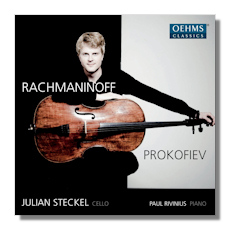
The Internet's Premier Classical Music Source
Related Links
-
Prokofieff Reviews
Rachmaninoff Reviews - Latest Reviews
- More Reviews
-
By Composer
-
Collections
DVD & Blu-ray
Books
Concert Reviews
Articles/Interviews
Software
Audio
Search Amazon
Recommended Links
Site News
 CD Review
CD Review
Russian Chamber Music for Cello

- Sergei Rachmaninoff:
- Sonata for Cello & Piano in G minor, Op. 19
- Vocalise Op. 34 #14
- Prélude Op. 2 #1
- Danse Orientale, Op. 2 #2
- Lied for Cello & Piano
- Serge Prokofieff: Sonata for Cello & Piano in C Major, Op. 119
Julian Steckel, cello
Paul Rivinius, piano
Oehms OC426 76m
German cellist Julian Steckel (b. 1982) won first prize at the 2010 ARD Competition, but he has actually been a veteran performer on the concert stage and in the recording studio for a number of years. Indeed, this appears to be his ninth CD, having earlier recorded sonatas by Poulenc, Debussy, Mendelssohn and others, concertos by Korngold and Goldschmidt, and larger chamber works by Haydn, Mozart, and Brahms, and in collaboration with such renowned artists as Martha Argerich. Coincidentally, German-born pianist Paul Rivinius also won a first prize at the ARD Competition (1998), but as a member of the Clemente Trio. He was also a one-time member of the Claudio Abaddo-led Gustav Mahler Youth Orchestra. Together Steckel and Rivinius offer highly individual performances of the two sonatas and other works on this new Oehms recording.
The sound of Steckel's cello on this disc is rather distinctive and thus deserves comment. The instrument is a modern one, a Speyer 2005, built by Urs W. Mächler, and it has has a creamy tone, especially in the lower ranges, but can have a slight tendency to wail at the upper end. In the Rachmaninov sonata Steckel's inclination to use a liberal amount of vibrato may well serve the composer's lush lyrical outpourings well, but some listeners might regard it as too much of a good thing. In the Prokofiev sonata Steckel seems perfectly attuned to Prokofiev's somewhat spicier expressive language, cutting back a bit on the vibrato and the more buttery approach. Having written what may seem to suggest that Steckel goes a little overboard in the Rachmaninov, I must point out that the work is often viewed as a sonata for piano and cello, not for cello and piano, largely because of the difficulty of the piano part. Steckel seems to have decided to put the cello front and center in this performance, and it appears the sound engineers accommodate him quite well with close-up miking, which may largely or in part account for the cello's sometimes fulsome tone in the upper range. The results are a songful, emotionally charged and highly dramatic performance of this work. It's a piece Rachmaninov wrote shortly after his Second Piano Concerto and it carries much the same kind of easy-listening post-Romantic character, though its four-movement structure and somewhat more fluent thematic material are clearly different.
Steckel and Rivinius capture the lyrical side of Rachmaninov with a heart-on-sleeve mindset, but they also manage to effectively impart a sense of menace to the second movement's main theme and brilliantly contrast the celebratory triumph in the finale with its ravishingly beautiful alternate theme. Their account of the Prokofiev begins in a muscularly ponderous way in the philosophical sort of opening to the work, where Steckel's tone is imposing in its low drones. The duo capture the wistful lyricism convincingly, as well as the gentle but dark nature of the first movement. They invest the next two movements with wit and playfulness, but deftly deliver the finale's close with that curious but necessary sense of ambivalence: is Prokofiev ending with a valedictory sigh or a grand philosophical statement of triumph? I think Steckel and Rivinius's bigger sounding treatment leans toward triumph.
The team's rendition of Vocalise is lovely, and the other fillers are similarly convincing. As suggested above the sound favors the cello, but overall is vivid and quite powerful. There are many recordings of both sonatas here, but this exact coupling of them can be had from Sony in performances by none other than the iconic team of Yo-Yo Ma and Emanuel Ax. Convincing as that pair can be, their Prokofiev is a little tepid, where Steckel and Rivinius are vital and rich in detail. In the end, if you want this coupling, it would be hard to beat Steckel and Rivinius, and in addition they throw in some nice fillers.
Copyright © 2013, Robert Cummings





















